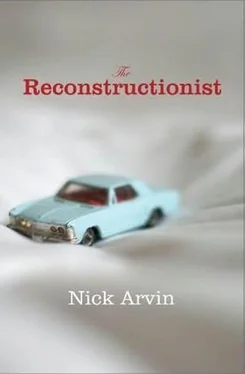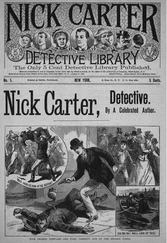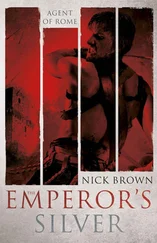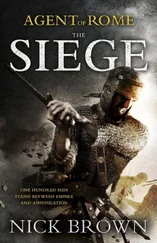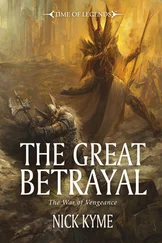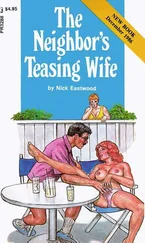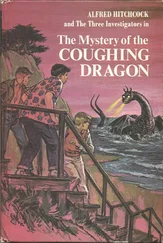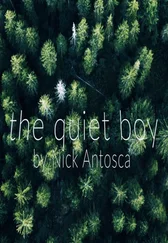‘I took all that to the office and told them this was everything I had of John’s work, and I didn’t want anyone from there contacting me again.’
She rested one hand on his knee, and he studied her veins and tendons, the faint small hairs, the irregularity of scarred skin near the base of the thumb. He asked about her day, she described the variable moods of children, and then they sat touching lightly while the traffic in the street buzzed. She asked, not looking at him, ‘How long will it be like this?’
‘What do you mean?’
‘You don’t see anyone but me.’
‘What about you? How do you feel?’
‘I’m so absolutely fucking angry with him,’ she said.
It seemed odd to him that it really hadn’t occurred to him to be angry at Boggs.
‘How long?’ Softly. Her hand on his leg did not move away and neither did it tighten.
Feeling the question was unanswerable, he did not answer. He saw behind her, perched in a far upper corner of the room, a spider. It crept an inch down the wall, then returned to where it had started. Then he was aware again of her attention on him – it seemed to have tightened, and he observed suddenly how strange he was becoming. Had become. He bore responsibility, too, for her quiet. He had reduced her to quiet doodling.
Her fingers tightened slightly on his leg, then lifted away.
She stood and went out of the room. A cupboard door clattered. Ellis lifted a hand and held it, testing its heaviness. With a tap of noise a glass was set on the counter. Water hissed into the kitchen sink.
‘I’m sorry,’ he called.
She reappeared and stood looking at him. Not unkind. Not without patience. But looking. And he felt something in himself hiding. He wanted to ask her, What am I hiding? What is wrong with me? He recalled how, when searching for Boggs, he had wished to somehow pry under his rational processes. Maybe now he had succeeded, but if so it had been a foolish thing to hope for, because under them lay, it seemed, nothing.
When she turned away he was startled, as if he had forgotten the possibility of movement.
At dinner Heather lit two squat candles on the table that burned with tiny steady globular flames, and they ate Italian takeout with the television on, tossing its shifting light on the ceiling. In bed he clasped lightly around her back until she seemed asleep. With eyes clutched shut he waited for sleep, thinking of her attention on him. Not without patience, but with limits.
The first time he set out, he drove north a few miles, then turned in at a park that he knew and sat for some hours at the edge of a lake with a swim area to watch the children scream and splash one another. Behind him mountain bikes came down a rocky trail with the noise of rolling typewriters. As the day leaned into dusk the bikes grew fewer and the swimmers exited until the lake water lay smooth, and he sat alone in the bluish light that hovered off the water and recalled the dead man that he and Boggs had left, and who might still, for all that he knew, lie there undiscovered, because in the aftermath of Boggs’s death he had never mentioned it to the police.
The second time he made it to Coil. He circled on the roads, peering at the park, the strip malls, the old buildings in the old centre of town, many shut and boarded. Much of the local commerce had shifted to chain stores and restaurants around an interstate exit a couple of miles to the west. But the high school appeared unchanged, the library likewise; he avoided the street where he had grown up. In only a few minutes he was carried through town and out into the surrounding fields of corn and sugar beets. He discovered a new golf course – a startling open space of deep green and lifeless flags.
He turned back and stopped in front of a store that sold pet supplies. It stood in the place of a baseball-card shop that he remembered, and he sat not looking at the intersection where his brother had died, then stood out of the minivan and approached the intersection and with his hands in his pockets looked at the place. East across Mill Street lay the gas station where Heather had watched the accident, now a green-and-white BP – he studied it with a sense of unease. Whatever it had been back then, he felt pretty sure it hadn’t been a BP. Cattycorner from where he stood spread the trees and grass of the park that had held his favourite swings. The trees looked older and fewer now, and a weirdly rococo gazebo had been put up to rot. And south across Main Street lurked, presumably, the house where he had once lived; the tall fencing that ran alongside the street had been replaced, now even taller, painted a red brown. The lane counts on Mill and Main had not changed, but the lights suspended overhead appeared new, and in the years since the accident how many times had the asphalt been resurfaced, the kerbs rebuilt, the lane lines repainted? The entire pattern of it could have shifted several feet. The parking lot he stood in had a new kerb cut near the intersection. To what extent was this no longer really the place where Christopher had died? To a great extent. But there was no other place.
He didn’t want to be doing this work again. But he thought of the airlane nameplate and went forward. He paced the distances across the lanes, from light pole to kerb edge, from kerb edge to street sign, measuring a yard with each step, a simple skill that Boggs had made him practise. Boggs had also given him a five-pound sack of sugar and told him to test its weight at arm’s length, then gave him a desk lamp, a laptop computer, a brake drum, and asked of each, ‘More or less than five pounds? Guess the weight?’ Soon they descended to the basement garage where Boggs attempted, with loud failures, to juggle wrenches – the memory of the odour of motor oil and sawdust and the riotous clanging of the wrenches became suddenly so vivid that Ellis had to stop a minute and breathe.
He ripped a page from the back of the minivan’s owner’s manual and sketched the intersection in ballpoint and labelled it with his paced measurements. He added notes on light timing and traffic flow, and amid this work he noticed a new sensation – relief. As if he had swum nearly to the point of exhaustion, of drowning, but now his feet had found land. This work. How easy it was to move here. The relief unnerved and disappointed him.
Eventually he looked up and saw a woman, in sweatpants and a T-shirt snug enough to show the roll of her belly fat, standing outside the pet supply store, watching him. She smiled and moved to the side window of the minivan and tapped. ‘Ellis Barstow!’ she exclaimed as he rolled down the window. And he said hi, but who was she? Without provocation she talked about teachers he remembered and some of his friends. She mentioned Christopher, solemnly, and glanced at the intersection. She seemed his own age, more or less, but her weight had bagged into small jowls that exaggerated as she frowned. A spray of curling thin brown hair imperfectly covered her pink scalp. Ellis said little to encourage her, and finally she said, ‘You don’t recognise me, do you?’
He smiled and shook his head.
‘Kari Butters.’
Even this did not help. But he said, ‘Oh, yes, Kari. Of course.’ And because she still had a look of expectation, he added, ‘Wow.’
She mentioned other people, one feebly familiar, but more that it seemed to him he had never heard of before in his life. He nodded dumbly. He tried to subtract the jowls, subtract some wrinkles from around her eyes. But the effort gained him nothing. She talked on, faster and faster, and suddenly she said, with forced enthusiasm, ‘Well, how about you? What are you up to? What do you do?’
‘Nothing,’ he said. ‘Nothing right now.’
She waited.
‘I’m between jobs,’ he said. ‘Between things.’
Читать дальше
